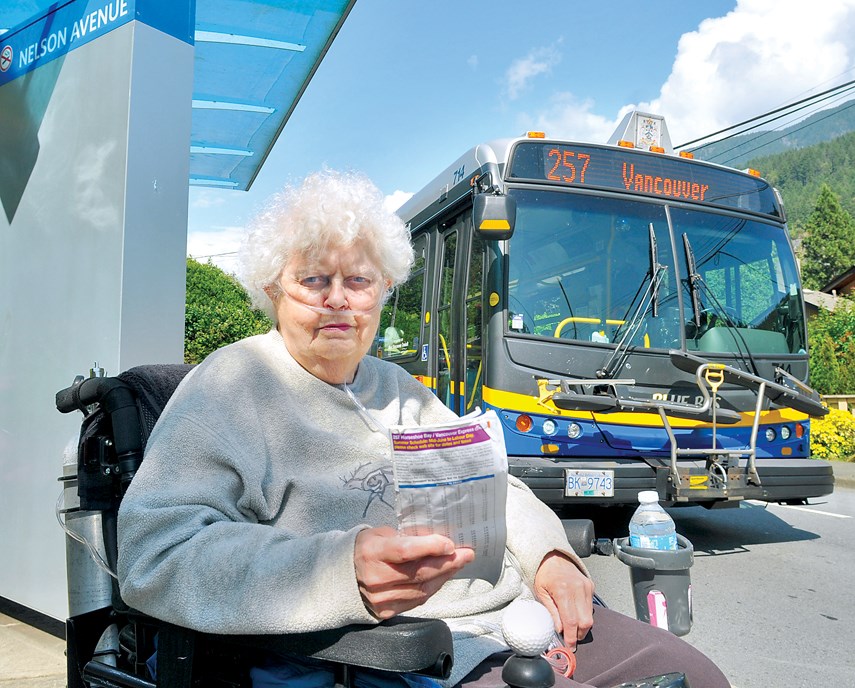A West Vancouver senior says she and others with mobility challenges are being left behind as TransLink cuts several stops from its bus routes.
The transit authority is planning to eliminate the last three stops on the 257 express route in Horseshoe Bay prior to the B.C. Ferries terminal, including the accessible stop outside Libby Lodge, a seniors’ residence on Nelson Avenue.
“There are a lot of people in this building with medical issues. They’re on disability pensions. They’re in wheelchairs – I’m in a wheelchair – and they’re incapable of walking that distance from the ferry terminal to here,” said Pamela Best, a 17-year resident of Libby Lodge. “It’s the whole width of Horseshoe Bay. It’s right from one side to the other.”
TransLink arrived at the decision to cut the Horseshoe Bay stops, as well as several others downtown, at the Lions Gate Bridge and in Ambleside after conducting its Transit Network Review 2015.
The only alternative would be to take the 250 along Marine Drive, which is much slower and subject to delays thanks to construction, traffic and cyclists on the narrow, winding route, Best said, making it much harder to connect with other buses headed to Lions Gate Hospital or Vancouver General Hospital.
“It can be a real nightmare. You miss the connection to the 255,” she said.
TransLink did not respond to a request for comment by the North Shore News deadline Thursday but a letter sent to Best responding to her grievances said the change will benefit the majority of 257 riders who want to connect with a ferry.
“Given our funding situation, we are doing our best to meet growing demand within current resources – this requires difficult choices throughout the region. We will implement the 257 change as proposed as it will yield travel time and reliability benefits for the majority of customers. We realize that this has local impacts to you and your neighbours and I assure you we have not made the decision lightly. We will be monitoring the situation through ridership analysis, TransLink customer feedback and through the feedback that West Vancouver receives,” it read.
In light of the lack of progress, Best questioned the value of West Vancouver having its own Blue Bus contract service.
“What responsibility are they taking? I’ve been fighting with West Van transit over various things for 15 years,” she said.
West Vancouver Mayor Michael Smith said he personally lobbied TransLink to keep the Horseshoe Bay stops but had no luck convincing them.
“I wrote last October a personal letter to the acting president (of TransLink) saying we were very concerned. We were opposed to the changes. And TransLink, in their wisdom, chose to make changes anyway so really there’s nothing, unfortunately, we can do for the residents,” he said.
TransLink did, however, hold off on plans to eliminate the 258 UBC express bus entirely following consultation with the public and West Vancouver, Smith said, something that likely wouldn’t have been possible without the Blue Bus contract.
“It’s just unfortunate that the Libby Lodge residents are going to be inconvenienced but they still have access to a very fine bus service,” he said.
For Smith, the problem is indicative of the wider dysfunction with the way TransLink operates, with decisions about service being made by unelected bureaucrats and board members.
“It’s been four and a half years for me and the unfortunate thing is in four and half years, there’s been zero meaningful progress on TransLink. It’s still a mess where nobody really is in charge. There’s the province, the mayors, the TransLink board. It still goes around in circles and transit is too important to leave like this,” he said, noting Metro Vancouver is expecting another million people to inhabit the region.
“How can you do all that regional planning when you don’t have any control over transit planning? It just doesn’t make any sense for the residents of the region.”



